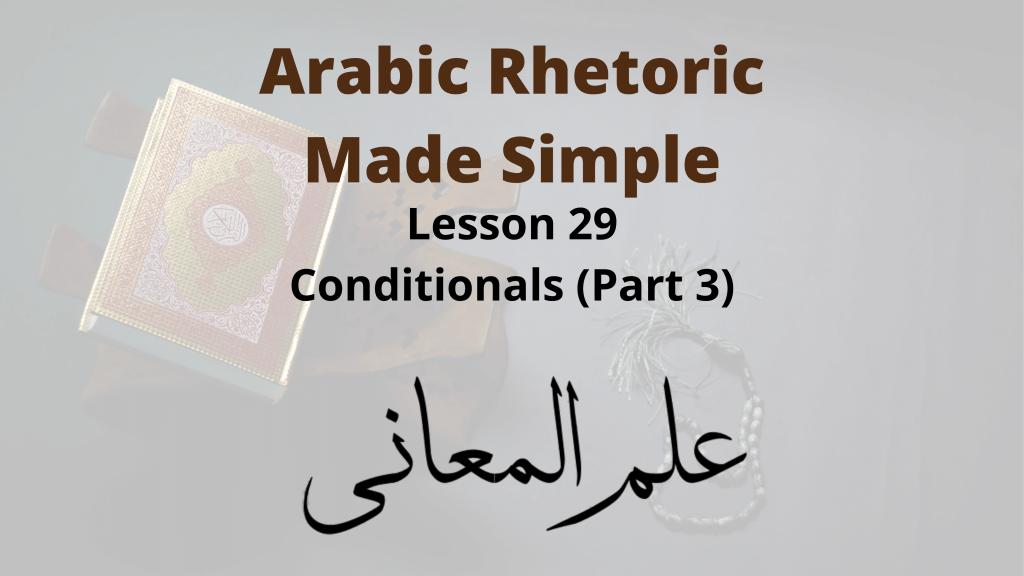In this lesson on Balagha, we are going to discuss the final anomaly related to conditionals in Arabic: لَوْ Followed by a Future Tense Verb

The anomaly we want to look at next is لَوْ being followed by a future tense verb.
Usually لَوْ is followed by a past tense verb because its meaning is that of the past.
For example: لَوْ جِئْتَنِي لَأَكْرَمْتُكَ (Had you visited me I would have honoured you).
Sometimes what happens is that لَوْ is followed by a future tense verb. Why does that happen?
Add Repetition
The first reason this happens is to add repetition to the verb. The translation will still be that of the past. But the مضارع verb will add a sense of repetition.
Remember مضارع is used to indicate on an incomplete/ imperfect action. An action is incomplete either because it is happening in the present, it will happen in the future, it happens repeatedly on occasion or it happens continuously without stopping, meaning it is not finished yet.
Because the word لَوْ is designed for the past tense, the present and future meanings are ruled out. Continuity is usually delivered by a jumlah ismiyyah, not a jumlah fi’liyyah. That just leaves repetition.
Therefore, when you see لَوْ followed by a مضارع you will translate it as past because of لَوْ, but you will add repetition because of the مضارع.
We can see an example of this where Allah says:

Notice here the لَوْ being followed by a مضارع. The meaning is more or less: “It is fortunate for you O Sahabah that every so often the Prophet (peace be upon him) doesn’t do things your way. If he had done things your way every single time, you would have fallen into misfortune”.
The meaning can also be: “It is fortunate for you O Sahabah that the prophet (peace be upon him) doesn’t do things your way every so often. If he had stopped to do things your way every so often, you would have fallen into misfortune”.
Notice that in one of the translations we have repetition of negation (He doesn’t do things your way at all). And in the other translation we have negation of repetition (He does things your way, but not always).
Both uses of لَوْ are possible in the Arabic language, but the first is far more common and is what is being intended. Meaning, the prophet (peace be upon him) does things your way, but every so often he doesn’t. And it is a good thing too, otherwise you would have fallen into misfortune.
The point of the issue here is that in لَوْ يُطِيعُكُمْ.
يُطِيعُكُمْ is مضارع, it is not ماضي. The idea is that it is indicating on repetition, because every so often the prophet (peace be upon him) does things his way and every so often he does things the sahabah’s way. Or rather we should say he does things Allah’s way. Because everything he (peace be upon him) says and does is from Allah.
Get The Listener to Envision an Event
Another reason to bring a مضارع after لَوْ is to have the listener envision an event.
Sometimes you are talking about an event that is extremely intense, or scary or just awe inspiring. And although it has already happened in the past (or will happen in the future but presented like already happened to stress the certainty, either way) you want your audience to bring it to the front of their minds and envision and imagine it as if it is happening right now. So in order to achieve this, you can use the مضارع verb.
We see an example of this in Allah’s speech where He says:

The event Allah is speaking about is yet to happen. It’s referring to the disbelievers being thrown into the Hellfire. And the Prophet (peace be upon him) has not witnessed it. It’s a future event the occurrence of which is certain. لَوْ has been used accordingly. Now, consistent with the use of لَوْ, we would expect a perfect verb to be used.
But because this will be an intense event, Allah wants the Prophet (peace be upon him), or indeed the listener to bring it to the front of his mind and imagine it as if it is happening right now. As such, Allah uses the مضارع to make it seem as though it is happening at this very moment.
In situations like this, we tend to translate لَوْ using the word “were”. “Were you to see when they will be suspended over the Fire”, instead of “Had you seen when they were suspended over the Fire”.
Indeed an even better translation would be: “And if you could just see when they will be suspended over the Fire”.
Now that we have seen several situations of حروف شرط being followed by ماضي or مضارع, you can start seeing some interesting patterns emerging. Namely, you will notice that ماضي and مضارع verbs are usually used to indicate on past, present and future tenses. But with conditional particles, the past, present and future actually comes from the حروف شرط; the إنْ , لَوْ and so on. The verb Is no longer burdened with the responsibility of having to tell you the tense. Therefore, the verb can now be used to tell you more subtle things, such as certainty, repetition and so on.
- Proceed to next lesson: Predicate: Indefinite, Definite and Specific
- Return to index page: Intro to Ilm Ul-Ma’ani
- Start free lessons: Sign Up for Free Mini-class